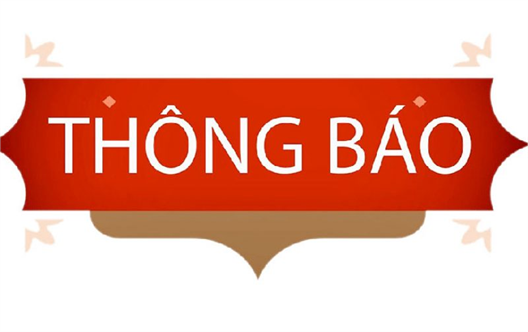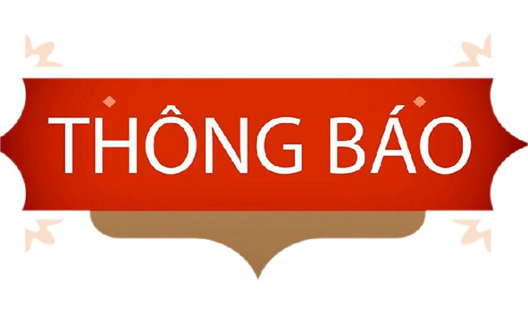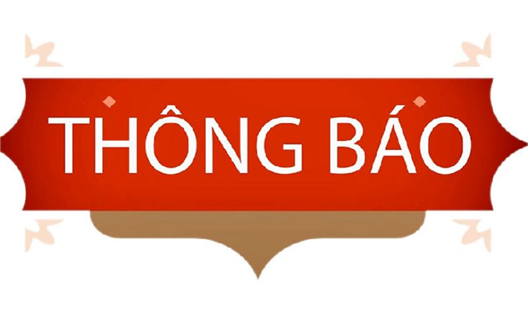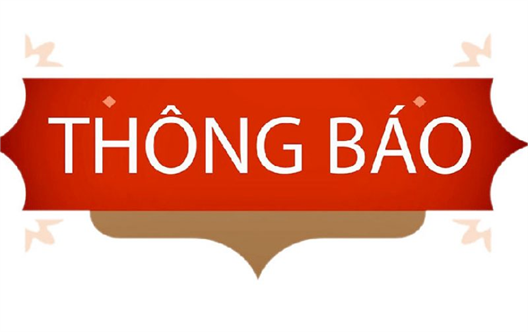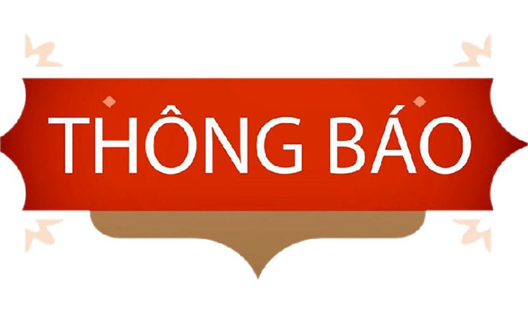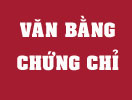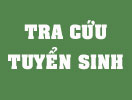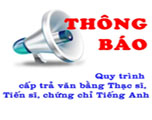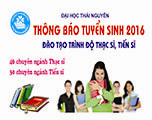Thông tin luận án
Ngày 16-05-2014
Thông tin luận án của NCS. Phạm Văn Hùng
Tên đề tài luận án tiến sĩ: Xây dựng chuẩn đầu ra nhằm nâng cao chất lượng chương trình đào tạo Kỹ thuật Cơ khí tại Đại học Thái Nguyên.
Chuyên ngành: Quản lý giáo dục.
Khoá đào tạo: 2009 - 2014
Người hướng dẫn khoa học: TS. MELCHOR MELO O.PLACINO
Đơn vị đào tạo: Trường Đại học Nông Lâm, Đại học Thái Nguyên.
Cơ sở đào tạo: Chương trình liên kết đào tạo Tiến sĩ Quản lý giáo dục giữa Đại học Thái Nguyên - Việt Nam và Đại học Tổng hợp Southern Luzon – Philippines.
Đơn vị cấp bằng: Đại học tổng hợp Southern Luzon – Philippines.
NHỮNG KẾT QUẢ MỚI CỦA LUẬN ÁN
Nghiên cứu đã tiến hành xây dựng dự thảo chuẩn đầu ra, lấy ý kiến khảo sát của các bên liên quan (sinh viên năm cuối; Giảng viên; Cựu sinh viên; Nhà tuyển dụng) về dự thảo chuẩn đầu ra và đạt được kết quả như sau:
1. Luận án đã chỉ ra đánh giá của giảng viên, sinh viên, cựu sinh viên và nhà tuyển dụng về tầm quan trọng của các tuyên bố trong chuẩn đầu ra dự thảo của chương trình Kỹ thuật Cơ khí về Kiến thức và Lập luận kỹ thuật, Kỹ năng chuyên môn – Tổ chất cá nhân, Các kỹ năng làm việc nhóm và Giao tiếp và Áp dụng kiến thức phục vụ cho xã hội. Nhóm bốn khách hàng chủ yếu này cho rằng các tuyên bố chuẩn đầu ra dự thảo là quan trọng và cần thiết đưa vào chuẩn đầu ra của chương trình. Các tuyên bố chuẩn đầu ra được đánh giá ở mức quan trọng là 2,19 (thang đo 3 mức với mức 3 là rất quan trọng).
2. Luận án đã chỉ ra rằng chuẩn đầu ra hiện tại của chương trình không đáp ứng được yêu cầu của sinh viên. Các kết quả nghiên cứu về các chủ điểm Kiến thức và Lập luận kỹ thuật, Kỹ năng chuyên môn – Tổ chất cá nhân, Các kỹ năng làm việc nhóm và Giao tiếp và Áp dụng kiến thức phục vụ cho xã hội cho thấy khoảng cách rõ rệt giữa mức độ hiện tại và mong muốn. Kết quả cụ thể với từng chủ điểm xếp theo cặp hiện tại – mong muốn là: Kiến thức và Lập luận kỹ thuật (2,48 và 3,18), Kỹ năng chuyên môn – Tổ chất cá nhân (2,23 và 3,04), Các kỹ năng làm việc nhóm và Giao tiếp (2,19 và 3,16) và Áp dụng kiến thức phục vụ cho xã hội (1,99 và 2,92).
3. Luận án đã cho thấy giảng viên mong muốn nhiều hơn từ sinh viên tốt nghiệp ngành Kỹ thuật Cơ khí. So với mức độ mong muốn, hiện tại kiến thức, kỹ năng và thái độ sinh viên tốt nghiệp có được còn thiếu, khoảng cách tính theo điểm đánh giá từ 0,91 đến 1,1 điểm. Cụ thể như sau: Kiến thức và Lập luận kỹ thuật (2,29 và 3,20), Kỹ năng chuyên môn – Tổ chất cá nhân (2,16 và 3,35), Các kỹ năng làm việc nhóm và Giao tiếp (2,27 và 3,53) và Áp dụng kiến thức phục vụ cho xã hội (2,01 và 3,21).
4. Kết quả của luận án cho thấy đầu ra hiện tại của sinh viên tốt nghiệp ngành Kỹ thuật Cơ khí không đáp ứng được yêu cầu của cựu sinh viên. Theo đánh giá của cựu sinh viên, liên quan đến chủ điểm Kiến thức và Lập luận kỹ thuật hiện tại sinh viên đang đạt ở mức 2,59 trong khi mong muốn của cựu sinh viên là ở mức 3,50. Đối với chủ điểm Kỹ năng chuyên môn – Tổ chất cá nhân hiện sinh viên đang được đánh giá ở mức 2,55 và mức mong muốn là 3,60. Tương tự như vậy ở chủ điểm Các kỹ năng làm việc nhóm và Giao tiếp, cựu sinh viên đánh giá mức hiện tại là 2,48 và mức độ mong muốn là 3,75. Đối với chủ điểm Áp dụng kiến thức phục vụ cho xã hội, mức độ hiện tại là 2,42 và mức độ mong muốn là 3,48.
5. Luận án đã chỉ ra chuẩn đầu ra hiện tại không đáp ứng được yêu cầu của nhà tuyển dụng lao động. Với các mức đánh giá cho các chủ điểm hiện tại là Kiến thức và Lập luận kỹ thuật (2,26), Kỹ năng chuyên môn – Tổ chất cá nhân (1,93), Các kỹ năng làm việc nhóm và Giao tiếp (1,18) và Áp dụng kiến thức phục vụ cho xã hội (1,72), nhóm nhà quản lý, sử dụng lao động đánh giá chuẩn đầu ra hiện tại ở mức thấp nhất trong nhóm bốn bên liên quan chính của chương trình. Căn cứ vào mức đánh giá hiện tại như vậy, mức độ mong muốn đối với các chủ điểm trên lần lượt là 3,22; 2,97; 3,29 và 2,90.
6. Nghiên cứu đã hoàn thiện chuẩn đầu ra cho ngành Kỹ thuật Cơ khí thông qua việc sử dụng các kết quả nghiên cứu về mức độ mong muốn của các bên liên quan, kết hợp với việc sử dụng thang năng lực Bloom và các động từ sử dụng trong việc viết chuẩn đầu ra.
KHẢ NĂNG ỨNG DỤNG TRONG THỰC TIỄN VÀ NHỮNG VẪN ĐỀ CÒN BỎ NGỎ CẦN TIẾP TỤC NGHIÊN CỨU
* Khả năng ứng dụng trong thực tiễn:
- Kết quả nghiên cứu cung cấp phương pháp rà soát, xây dựng lại chuẩn đầu ra cho các ngành đào tạo khác.
- Nghiên cứu đã cung cấp cho ngành đào tạo Kỹ thuật Cơ khí chuẩn đầu ra được xây dựng với sự tham gia của các bên liên quan, đáp ứng nhu cầu của các bên liên quan, có sự tham khảo các chương trình tiên tiến trên thế giới đáp ứng nhu cầu xã hội và hội nhập quốc tế.
* Những vấn đề bỏ ngỏ cần tiếp tục nghiên cứu:
- Nghiên cứu sâu hơn sẽ tập trung vào việc xây dựng chương trình đào tạo nhằm đáp ứng các yêu cầu về kiến thức, kỹ năng và thái độ đã được xây dựng trong chuẩn đầu ra.
- Xây dựng kế hoạch bồi dưỡng, đánh giá giảng viên đáp ứng chương trình đào tạo.
- Đổi mới công tác quản lý; Đổi mới phương pháp giảng dạy và phương pháp học; Đổi mới phương pháp kiểm tra đánh giá.
INFORMATION OF DOCTORAL DISSERTATION
DEM. Candidate: Pham Van Hung (Hero)
Research title: Enhancing the Mechanical Engineering Program of Thai Nguyen University through a redesigned Learning Outcomes.
Major: Educational Management
Training course: 2009 - 2014
Scientific supervisor: MELCHOR MELO O.PLACINO, Ph.D
Training location: College of Agriculture and Forestry, Thai Nguyen University, Vietnam.
Type of program: International joint training program on Doctor of Educational Management, between Thai Nguyen University - Vietnam and Southern Luzon State University – Philippines on Educational management.
Degree granting institution: Southern Luzon State University, Philippines.
THE NEW SCIENTIFIC FINDINGS
The research designed the draft learning outcomes, did survey on the stakeholders of the program (graduating students; teachers, alumni and employers) and redesigned the learning outcomes. The results are as follows:
1. The dissertation indicated that the importance of draft learning outcomes items of the Mechanical Engineering Program in terms of Disciplinary Knowledge and Reasoning, Personal and Professional Skills and Attributes, Interpersonal Skills: Teamwork and Communication and Applying Knowledge to Benefit Society under the view of the four main stakeholders of the MEP are almost the same. They shared their interest in those topics and most of them are needed to be in the redesigned learning outcomes with the average rating of importance is 2.1918 (3-level-scale).
2. The dissertation determined the current status of learning outcomes did not meet with the expectation of the graduating students. The research results of the current status of the learning outcomes and the expected ones regarding topics are as follows in pair: Disciplinary Knowledge and Reasoning (2.48 and 3.18), Personal and Professional Skills and Attributes (2.23 and 3.04), Interpersonal Skills: Teamwork and Communication (2.19 and 3.16) and Applying Knowledge to Benefit Society (1.99 and 2.92).
3. The dissertation showed that according to the faculties current status of learning outcomes did not meet with their expectation. The research results of the current status of the learning outcomes and the expected ones regarding topics are as follows in pair: Disciplinary Knowledge and Reasoning (2.29 and 3.20), Personal and Professional Skills and Attributes (2.16 and 3.35), Interpersonal Skills: Teamwork and Communication (2.27 and 3.53) and Applying Knowledge to Benefit Society (2.01 and 3.21).
4. The results of dissertation presented that the current status of learning outcomes did not meet with the expectation of the alumni. The research results of the current status of the learning outcomes regarding Disciplinary Knowledge and Reasoning (2.59), Personal and Professional Skills and Attributes (2.55), Interpersonal Skills: Teamwork and Communication (2.48) and Applying Knowledge to Benefit Society (2.42) while the expected level of proficiency of those topics are 3.50, 3.60, 3.75 and 3.48 respectively.
5. The dissertation identified the current status of learning outcomes did not meet with the expectation of the employers. With regard to Disciplinary Knowledge and Reasoning, the current proficient level was 2.26 while the expected level of proficiency of the topic was 3.22. As Personal and Professional Skills and Attributes was concerned the results were 1.93 for the current and 2.97 for the expected). The employers also rated the current proficient level of Interpersonal Skills: Teamwork and Communication topics at 1.81 and what they expected was at 3.29. Learning outcomes relating to Applying Knowledge to Benefit Society got big gap (1.18 point) between the current (1.72) and expected level of proficiency (2.90).
6. The research completed the redesigned the learning outcomes by employing the results of the survey and combining the expected level of proficiency of the graduates of the MEP given by the four main stakeholders, using Bloom taxonomy and the verbs in the field.
APPLICATION FEASIBILITY AND RECOMMENDATIONS FOR FURTHER STUDIES
* Application feasibility:
- The results of research provide a method to redesign learning outcomes at program level.
- Besides, it provided the Mechanical Engineering Program with the redesigned learning outcomes which meet the requirements of the society and the international integration.
* Recommendations for further studies:
- Further research in the future will be in the field of developing a curriculum which could provide all necessary knowledge, skills and attitudes that were stated in the learning outcomes of the Program.
- Developing stable plans for evaluating staff to meet the requirements of the program;
- Renewing the educational management; Renewing teaching and learning methods; Renewing testing and evaluation methods.
